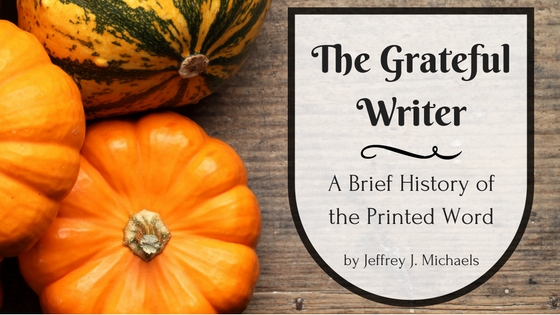by Jeffrey J. Michaels
I cannot think of a better time in history to be a writer. Sure, it is tough to make a living at it, but for those seeking the opportunity to become a published author, this is the authorial space age, baby! And a moon landing is within reach of everyone.
The First Writers
Think of it: After Cro-Magnons got out of their caves and decided they wanted to be able to transport the stories they’d been painting on cave walls, humanity started to create little bits of cuneiform-carved mud to record important events, like the selling of a goat for enough wheat to make Enkiduian amounts of beer. (And of course the character of Enkidu got to have an epic meeting with heroic Gilgamesh in those proto-books.)
Then one day, those ancestors discovered that processed plant pith and animal skins were much lighter and rolled up nicely around sticks. Papyrus and vellum put the cave painting business firmly into the history scrolls. Of course if you were Pharaoh you created your own caves and painting but that was a nostalgic Luxor-y. It was important to master the new scrolling technology if you wanted to be included in the Library of Alexandria. And you are not a REAL writer if you’re not still a little bit bummed about THAT nasty episode.
Penmanship
Soon enough, paper evolved from papyrus, and paper pages became the latest and greatest advancement of the day. In the not quite as old days, a writer wrote longhand on paper with pencil. They scratched out sentences that did not work, or rewrote paragraphs in the margins of their manuscript, so-called because it was Manually Scribed. Late 16th cent.: from Medieval Latin manuscriptus, from manu ‘by hand’ + scriptus ‘written’ (past participle of scribere).
Legibility mattered. The author needed to know how to communicate clearly using a skill called penmanship. I do not know if there was ever such a term as quillmenship. If a word was misspelled, the writer either had to possess the knowledge that it was wrong because they were well read and educated, or they relied on an editor to catch and correct any errors in spelling or grammar.
An Industrial Revolution
As the industrial revolution created new machines that offered an easier, more convenient way to create and deliver a story, the would-be author once again had to up their game and knowledge of the technology. The long-suffering editor, however, would never again look at a hand-written manuscript after the advent of the typewriter.
The keyboard required every writer to know how to type and apply the correct format (and every single page needed to be formatted). If you did not use carbon paper then there was only one copy of your work. If that were lost your time was spent attempting to recreate your book from scratch. Then a second copy needed to be typed and submitted to the editor and publisher, who bloodied your hard copy with their brutal red pens, thereby necessitating yet another rewrite (re-type) and the creation of a third, fourth, and probably a fifth draft. Many writers became known for their alcoholic consumption when they were asked to create a fifth draft. Get it? Fifth? Draft?
Each draft was sent by mail with appropriate postage plus return postage, and then wait, wait, wait. The invention of the SASE is likely to be a forgotten bit of history, but it was vital to the process. A self-addressed stamped envelope was required if you wanted a response. Sometimes, oftentimes, the SASE didn’t matter. You still never heard from the publisher again and must assume that your laboriously written book was now merely slush pile matter.
If you ever received a rejection letter it was almost a relief, because then you knew that someone somewhere read your words and made a judgment about them. But why was it rejected? “Your work does not fit our needs at this time,” was the most probable response.
Traditional Publication is Born
If you were fortunate, and did your homework, and appealed to a person likely to be interested in your style or genre, you might actually gain a critique with the rejection. This could be exciting! This meant that someone took the time to attempt to nurture you, and that your book actually captured their interest. A relationship could be developed and years may pass, but eventually, against outstanding odds, you may gain a contract! They would then ask what you were currently working on and you would think, “I’m working on getting this manuscript published and making a million bucks,” but the publisher was already seeking a follow-up. You would then sit with a pad of paper and pencil and the process would once again begin.
Within recent memory, people began going to college to gain a Bachelor of Arts degree in English, an MFA, or some literature-related study to gain the necessary knowledge to become an author. What they often gained was a degree in how to get traditionally published and support the traditional path to publication. In other words, they were able to supplement their earnings as a writer with a real job as an editor or reviewer or magazine contributor or even as a teacher, teaching the traditions. Credentials meant legitimacy and offered relief from the dread tag of “self-published” being assigned to your soon-to-be obscure book.
And then science fiction happened. Y2K came and went and it was wonderful. The computers failed to self-destruct and the world evolved into the internet. Look what hath been wrought!
The Magic Box
As a lousy typist (but a would-be storyteller/successfully published author), I find myself eternally grateful to the vexing and oft times problematic technology of the 21st Century. Just the fact that I EXIST in the 21st Century is a type of science fiction to the ten year old me. Certainly technology has failed me on the personal-rocket-pack scale, but I am perpetually astounded by the vast array of content available to me wherever I find myself on the planet. Every form of research or fact I desire is just a magic, finger-swipe away.
I now have the ability to make notes using electronic document programs available to me on my phone (aka the magic box) either by typing on a virtual keyboard or by using my voice. The latter more often than not yields some writing of dubious literary value, but hey, crappy first draft by voice is still sci-fi to the kids in the 1950s.
Today, using a machine that fits on your lap you can write, edit, submit to critique groups, commune and commiserate with fellow struggling writers, and then when no agents or publishers respond to your well-crafted website and platform, you can turn to Create Space or any other myriad formats for Self-Publishing (I mean INDIE publishing) and within a matter of days cobble together a cover, gain an ISBN number, and publish straight to the awaiting audience. Will it suck? Is it genius? You won’t know until you put your work out there. Is it legitimate? By the measuring stick of ever increasing sales or personal satisfaction, YES!
The Democratic Process
In our times a book can happen in days rather than years. We have a world that says everyone, with a certain amount of savvy, can now be published authors. Is this a good thing or not? That is a philosophical debate. Is it the ultimate in democratic, everyone-gets-a-voice society? Yes, pretty much it is, along with the internet discussion threads. Will anyone read/listen to your words? Up to you, mostly. You still have to have platform and publicity and reviews on Amazon and pay attention to sales and ranking algorithms and such stuff that causes most creative souls to cringe and whimper.
But, aren’t you grateful that you live now, rather than at the time of the invention of the printing press? Inking a text block can be so messy.
And did I mention spellcheck? Yeah, now you’re feeling grateful!
***

Jeffrey J Michaels, Author
Jeffrey J. Michaels is a Gemini. As such he is deeply involved in whatever interests him at the moment. His describes his book A Day at the Beach and Other Brief Diversions as “metaphyictional,” combining fantasy and humor with metaphysical elements. He is currently polishing a sweeping fantasy series of interconnected tales collectively known as The Mystical Histories. It is varied enough that he says he may even finish most of the stories. In his real life he is a well-respected creative and spiritual consultant. He does not like to talk about his award winning horror story.



Still laments the burning of the Library at Alexandra…
No past lives here, just a fervent knowledge of history